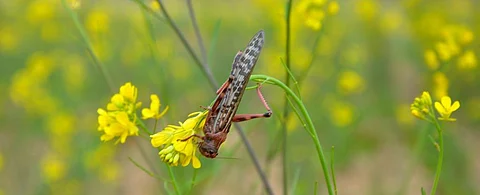

Swarms of locusts have invaded the border districts of Rajasthan and Gujarat this winter, in one of the most serious attacks by the insects since 1993.
Measures to control the pests had covered 370,000 hectares (ha) till January 12, 2020. The area covered in 1993 was 310,482 ha.
“It is more serious than 1993,” Suwa Lal Jat, joint director at the agriculture department of Rajasthan, said. He is coordinating with the Directorate of Plant Protection, Quarantine and Storage (PPQS), that runs locust watch centres (LWCs) as well as with other state government departments.
The pest attacks have been especially hard on farmers of the 11 Rajasthan districts that have been affected — Barmer, Churu, Jodhpur, Nagaur, Jaisalmer, Jalore, Jhunjhunu, Sikar, Sriganganagar and Bikaner.
One such farmer is Jugta Ram, who owns 12 ha of land in Barmer, where he grows cumin and castor. A locust swarm 9 kilometres in length and 3 km in width invaded Ram’s village of Tardo Ka Taal on December 26, 2019, and devoured the crops.
The desert locust that belongs to the grasshopper family, covers large distances during the day, with the help of the wind. The insects rest at night.
Locusts are considered to be among the most dangerous pests known to humanity. They reproduce fast — 20-fold in three months.
But they are most lethal because they can eat through large swathes of crops. Adult locusts can eat their own weight every day and a swarm can consume vast quantities of food. They thus pose a threat to human food security.
The swarm was stationed on the outskirts of Isrolaga village, 30 km north of Tardo Ka Taal, on the night of December 25, 2019.
“The wind was blowing west-to-east for more than two weeks. We were sure that there would not be any attack on our village. But all that changed on December 26,” Ram said.
“It (the swarm) came like a black cloud filled with rain, moving fast with the help of a north-to-south wind,” he added. The men and women of the village came out of their homes and began to beat their saucepans, a traditional method to drive away locusts.
“We made a lot of noise. But it was simply not enough to ward off millions of locusts,” Ram said. He pointed at his ‘Khejiri’ tree (Prosopis cineraria). Its branches broke after the swarm sat on it.
The locust attack left Ram in deep trouble. He was already under debt amounting to Rs 3.5 lakh. I suffered losses of Rs 4 lakh after the locusts ate my crop, he said.
Government action
No compensation has been announced for farmers till now even though Chief Minister Ashok Gehlot made a round of affected districts.
“We are making efforts to neutralise the locusts which laid eggs in our area, while keeping a lookout for new swarms,” Jat said.
The state government has pressed 54 teams in order to survey and monitor swarms. About 450 tractors, with mounted sprayers have been deployed in different districts. The PPQS has also deployed 45 vehicles.
“We are encouraging farmer groups to hire tractors on rent, take free supply of insecticides and spray them as government agencies cannot reach all areas at a short notice. We will reimburse them,” Jat added.
The swarms are also spreading east and north into Punjab, Haryana and western Uttar Pradesh. The UP government’s Sugarcane Commissionerate issued a press note asking sugar cane growers to use the saucepan method during locust attacks.
But officials are in denial mode. KL Gujjar, deputy director of PPQS, denied any expansion of the attacks. The PPQS had also denied locust attack in May 2019, which cost farmers heavily.
It is not just India that is bearing the brunt of locust attacks. The pests have attacked 60 countries, encompassing an area of 30 million sq km.
Pakistan, which shares the Thar desert with India, is also witnessing locust attacks. Locusts have invaded newer areas this time like the country’s largest city, Karachi.
Forty per cent of Pakistan’s crops have been eaten by locusts, according to the Sindh Chamber of Agriculture. These include wheat, cotton and tomatoes in the districts of Tharparkar, Mirpur Khas, Sanghar in Sindh, of which Karachi is the capital.
The Sindh Abadgar Board, an organisation of Pakistani farmers, has urged the federal government to seek international help.
This is the first of a multi-part series